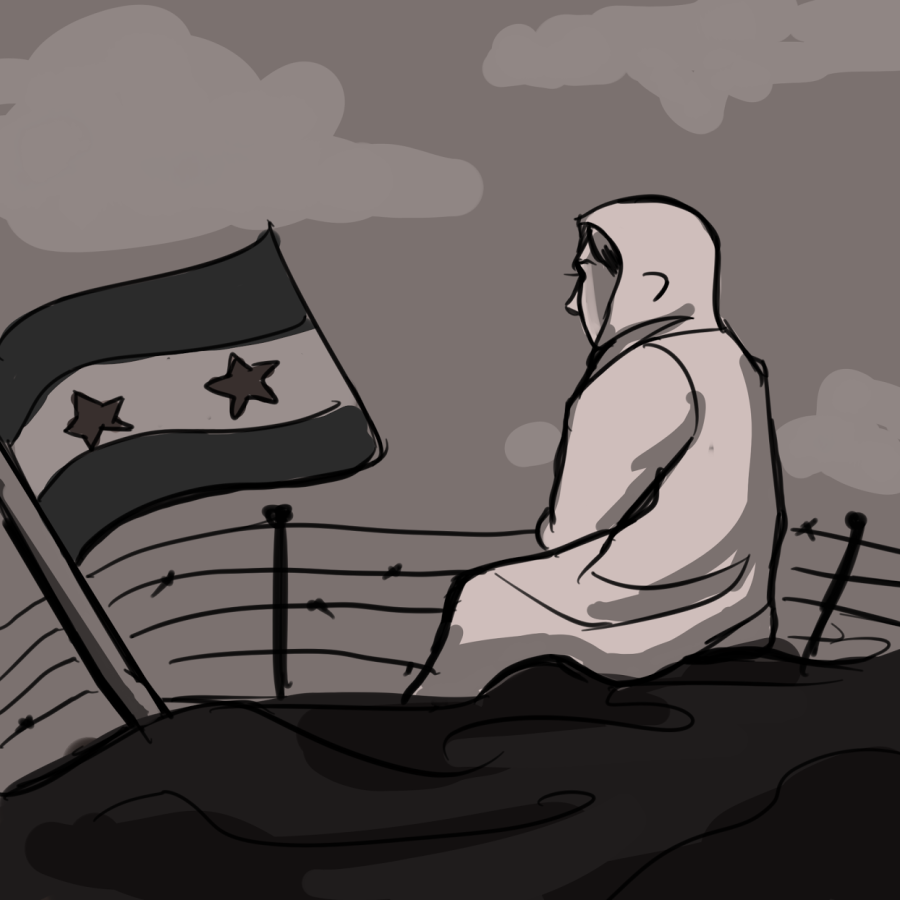Of Helping Hands and Humanitarian Aid: The Role of America in the Syrian Refugee Crisis
December 20, 2015
Turn on the television, and find uniformed militants assaulting a small village near desolate fields. Check the breaking news, only to watch frantic mothers anxiously holding their children as they weep in their arms. Pick up a magazine at the store, and witness the countless waves of those traveling on foot, traversing the borders that separate nations. The Syrian refugee crisis is currently one of the most widely discussed, debated, and recognized topics around the world.
As November dwindles down and empty trees signal the beginning of December, Syrian refugees come pouring across the pepper fields common to the region by the tens of thousands near the Mürşitpınar border crossing in Turkey. According to Amnesty International, Turkey hosts 1.9 million refugees from Syria yearly, more than any other country worldwide.
The notorious Syrian civil war began with anti-government protests before escalating into a full-scale battle. Ever since the Syrian civil war began, more than 240,000 people have been killed, including 12,000 children. One million more have been wounded or permanently disabled.
The war has become increasingly deadly since foreign powers have joined the conflict, leaving the refugees searching for a place of financial stability and religious freedom. According to UNHCR, at the end of the 2014, there was an estimated 14.4 million refugees (a 19 percent growth from the previous year). According to 2015 statistics, it is estimated that there are over 4.2 million Syrian refugees.
“This isn’t just about Turkey or Syria anymore,” says Selin Ünal, a spokeswoman for UNHCR, in a recent National Geographic article titled “Fleeing Terror, Finding Refuge.” “This is a problem that will affect the entire world. There is something historic going on here.”
America is often asked about their take on the Syrian refugee crisis. For the most part, Americans are conflicted on how to deal with the crisis.
Many American citizens are concerned with how America will provide for refugees in the economy’s current state. While Americans are wide awake to the statistics and facts surrounding the refugee crisis, nearly half of the families in the United States live below 250 percent of the federal poverty level. Citizens are worried about welcoming refugees, in that they might add economic burden to the already serious situation inside the United States’ borders.
Others also feel that terrorism could also become a serious issue if America decided to let in refugees. One often-cited example is the recent coordinated terrorist attack in Paris, France. Some of the terrorist bombers in the Paris attacks lied about their identity and snuck in through the borders of France as “refugees” from another country.
However, some disagree. Ben Zhou ‘16, a student at Ridge, believes that “regardless of where you are, there’s always going to be people who do bad things.” The aftermath of Paris has left Americans in fear of where refugees will flee to next. Zhou adds, “Unless you completely close down your borders and don’t let anyone in, there’s always going to be some threat that’s involved.”
Moreover, some believe that Americans are morally obligated to provide shelter to refugees due to American values and founding principles. “The United States fails to comprehend their major role of sheltering those who lack shelter themselves,” comments Andrea Zhang ‘19. She adds, As human beings, we are morally obligated to help those in need.”
Mr. Norris, a history teacher at Ridge High School, states that “the UN refers to the Right of Asylum as a reason to take in refugees, and America should pay attention to this matter. The refugee crisis is not just a global issue, it is a human rights issue.”
From peaceful discussions to heated debates, the Syrian refugee crisis has Americans carefully thinking about their response. The refugee crisis has gone from a moral rights issue to a government issue to an economic dilemma. As citizens are constantly influenced by the news that much of society revolves around, current events often blur not only the borders between countries, but also the difference between right and wrong. The Syrian refugee crisis has forced the general public to question their role in answering the big question: What do we do next?


Grace • Dec 20, 2015 at 9:36 pm
SO AMAZING CHARLIZE. SO PROUD. 🙂
But in all seriousness, this is an important topic to address and I think your article sums it up perfectly, provides valuable insight, and poses an important call to action that leaves readers thinking about the issue at hand. AWESOME JOB!!!!!!!
Charlize Chen • Dec 20, 2015 at 11:40 pm
Thanks Grace! I’m glad you liked my article!